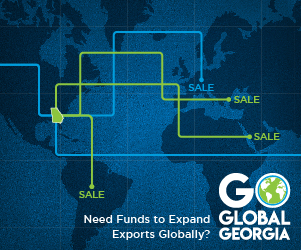Tips to Mitigate Risks and Lower Costs When Exporting

Exporting products around the world requires patience, strategy, and the dedication of time and resources to be successful. While the nuances of exporting can seem daunting, there are resources available to help make the process easier. We wanted to share some ideas to help your company mitigate risks and lower costs when exporting. Various private and public resources offer the services and programs described here. Depending upon your situation, you might find them to be helpful.
I. EXPORT CREDIT INSURANCE
Export credit insurance provides a means for exporters to insure their foreign receivables, transferring the risk of non-payment by overseas customers to a public entity like the Export-Import Bank of the United States (EXIM) or specialized private insurers like Coface and Atradius. Export credit insurance will typically cover up to 90-95% of a contract’s value, protecting the U.S. exporter from most defaults.
Export credit insurance is an excellent tool for risk mitigation. It also allows companies to offer payment terms to their foreign buyers, making them more competitive in global markets.
II. ATA CARNET
An ATA Carnet is an internationally-accepted customs document that allows exporters to temporarily export merchandise or equipment – duty and tax-free – for up to one year into countries that accept such carnets. By the end of the one-year period, all of the items listed on the carnet must return to the U.S., where they can enter duty and tax-free. Companies most often use ATA Carnets for transporting equipment or merchandise to trade shows and conferences, or when providing demonstrations and training to potential customers or partners.
The use of ATA Carnets can help companies reduce the costs of international business development. In the U.S., ATA Carnets are managed by the U.S. Council on International Business (https://www.uscib.org/register-and-apply/).
III. VAT REFUND SERVICES
Many countries charge a VAT (Value Added Tax) that is added to certain expenses incurred in those countries (i.e. hotels, conference, and trade show fees, restaurants, car rentals, meals, etc.). Companies may be unaware that VAT incurred during business travel can be recoverable. Even when companies are aware, they may not have the time or resources to deal with foreign tax regimes and fiscal authorities in order to apply for a VAT refund. This is where businesses like Universal VAT Services, a Georgia company, can help. For a percentage of the refunded VAT amount (no upfront fees involved), companies like Universal VAT Services provide a turnkey solution to companies whose invoices are eligible for a refund. The use of this type of service can help companies recoup some of the costs related to their international business development.
For more information, check out Universal VAT Services’ website or Google “VAT refund services.”
IV. PARTIAL REIMBURSEMENT GRANTS FOR SMALL BUSINESS EXPORTERS
The Georgia Department of Economic Development International Trade team (GDEcD Trade) supports the growth of Georgia jobs and businesses through exporting. GDEcD Trade offers Georgia companies the opportunity to apply for partial reimbursement of pre-approved export activities through its Go Global Georgia program.
Go Global Georgia, launched in partnership with the U.S. Small Business Administration, provides reimbursement funding to eligible Georgia exporters for pre-approved export activities. Most companies are eligible for reimbursement of up to 50% of actual export costs. This program is competitive and applicants must meet the evaluation criteria to receive funding. Funds are committed on a first-come, first-served basis.
Exporting can be challenging, but there are a host of resources available to help companies reduce risk and increase the chances of success. Continue the conversation with the GDEcD Trade team to learn more about programs and services that can help your company succeed in exporting.
